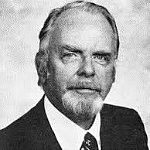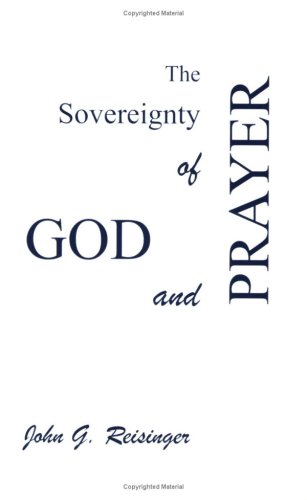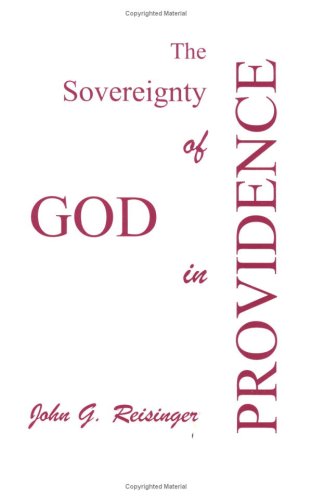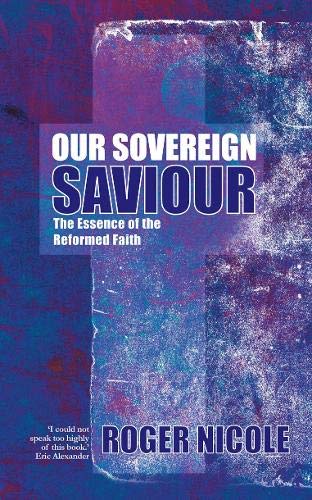Quotes about God-Sovereignty
Just as the rails of a train (track), which run parallel to each other, appear to merge in the distance, so the doctrines of God’s sovereignty and man’s responsibility, which seem separate from each other in this life will merge in eternity. Our task is not to force their merging in this life but to keep them in balance and to live accordingly.
You are perplexed by the doctrine of God’s sovereignty and election. I wonder that any man believing in a God should be perplexed by these. For if there be a God, a King, eternal, immortal, and invisible, He cannot but be sovereign – and He cannot but do according to His own will and choose according to His own purpose. You may dislike these doctrines, but you can only get quit of them by denying altogether the existence of an infinitely wise, glorious, and powerful Being. God would not be God were He not thus absolutely sovereign in His present doings and His eternal pre-arrangements.
Man’s dislike at God’s sovereignty arises from his suspicion of God’s heart… we are not always comfortable with the idea of being wholly at the disposal of God.
We must not misconstrue God’s sovereignty so as to make people mere puppets, so we must not press man’s freedom to the point of limiting God’s sovereignty.
Trusting God, 1988, p. 69. Used by permission of NavPress – www.navpress.com. All rights reserved. Get this book!
The sovereignty of God is often questioned because man does not understand what God is doing. Because He does not act as we think He should, we conclude He cannot act as we think He would.
Trusting God, 1988, p. 29. Used by permission of NavPress – www.navpress.com. All rights reserved. Get this book!
This is the essence of God’s sovereignty; His absolute independence to do as He pleases and His absolute control over the actions of all His creatures. No creature, person, or empire can either thwart His will or act outside the bounds of His will.
Trusting God, 1988, p. 36. Used by permission of NavPress – www.navpress.com. All rights reserved. Get this book!
It seems we will allow God to anywhere except upon His throne ruling His universe according to His good pleasure and His Sovereign will.
Trusting God, 1988, p. 36. Used by permission of NavPress – www.navpress.com. All rights reserved. Get this book!
No plan of God’s can be thwarted; when He acts, no one can reverse it; no one can hold back His hand or bring Him to account for His actions. God does as He pleases, only as He pleases, and works out every event to bring about the accomplishment of His will. Such a bare unqualified statement of the sovereignty of God would terrify us if that were all we knew about God. But God is not only sovereign, He is perfect in love and infinite in wisdom.
Trusting God, 1988, p. 45. Used by permission of NavPress – www.navpress.com. All rights reserved. Get this book!
If God is not sovereign in the decisions and actions of other people as they affect us, then there is a whole major area of our lives where we cannot trust God; where we are left, so to speak, to fend for ourselves.
Trusting God, 1988, p. 58. Used by permission of NavPress – www.navpress.com. All rights reserved. Get this book!
So while the Bible asserts both God’s sovereignty and people’s freedom and moral responsibility, it never attempts to explain their relationship.
Trusting God, 1988, p. 67. Used by permission of NavPress – www.navpress.com. All rights reserved. Get this book!
Prayer assumes the sovereignty of God. If God is not sovereign, we have no assurance that He is able to answer our prayers. Our prayers would become nothing more than wishes. But while God’s sovereignty, along with His wisdom and love, is the foundation of our trust in Him, prayer is the expression of trust.
Copied from Is God Really In Control? Trusting God in a World of Hurt by Jerry Bridges, copyright 2006, p. 69-70. Used by permission of NavPress – www.navpress.com. All rights reserved.
God can restrain not only people’s actions, but even their most deeply rooted desires. No part of the human heart is impervious to God’s sovereign but mysterious control.
Trusting God, 1988, p. 64. Used by permission of NavPress – www.navpress.com. All rights reserved.
Confidence in the sovereignty of God in all that affects us is crucial to our trusting Him. If there is a single event in all of the universe that can occur outside of God’s sovereign control then we cannot trust Him. His love may be infinite, but if His power is limited and His purpose can be thwarted, we cannot trust Him.
Trusting God, 1988, p. 37. Used by permission of NavPress – www.navpress.com. All rights reserved.
God’s sovereignty is always to His people in wisdom and in love. This is the difference between sovereignty in God and sovereignty in man. We dread the sovereignty of man, because we have no security of its being exercised in mercy, or even justice: we rejoice in the sovereignty of God, because we are sure it is always exercised for the good of his people.
Our yesterdays present irreparable things to us; it is true that we have lost opportunities which will never return, but God can transform this destructive anxiety into a constructive thoughtfulness for the future. Let the past sleep, but let it sleep on the bosom of Christ. Leave the Irreparable Past in His hands, and step out into the Irresistible Future with Him.
The sovereignty of God is the one impregnable rock to which the suffering human heart must cling. The circumstances surrounding our lives are no accident; they may be the work of evil, but that evil is held firmly within the mighty hand of our sovereign God… All evil is subject to Him, and evil cannot touch His children unless He permits it. God is the Lord of human history and of the personal history of every member of His redeemed family.
Nothing is a surprise to God; nothing is a setback to His plans; nothing can thwart His purposes; and nothing is beyond His control. His sovereignty is absolute. Everything that happens is uniquely ordained by God. Sovereignty is a weighty thing to ascribe to the nature and character of God. Yet if He were not sovereign, He would not be God. The Bible is clear that God is in control of everything that happens.
Is God Really in Control, Joni and Friends, 1987, p. 1, Used by Permission, www.joniandfriends.org.
There has been a wonderful alteration in my mind, in respect to the doctrine of God’s sovereignty, from that day to this… God’s absolute sovereignty… is what my mind seems to rest assured of, as much as of anything that I see with my eyes… The doctrine has very often appeared exceeding pleasant, bright, and sweet. Absolute sovereignty is what I love to ascribe to God… God’s sovereignty has ever appeared to me, [a] great part of His glory. It has often been my delight to approach God, and adore him as a sovereign God.
The Works of Jonathan Edwards, Selections, p. 59, 67, Published by the Banner of Truth Trust, Carlisle, PA 17013.
He not only is sovereign, and has a sovereign right to dispose and order in that affair; and He not only might proceed in a sovereign way, if He would, and nobody could charge Him with exceeding His right; but He actually does so; He exercises the right which He has.
There is no such thing as luck” or “accident”… We must resist limiting God’s sovereignty in the face of suffering. The comfort of God…is not His empathy with us as someone who feels the tragedy of evil but is helpless in it. Nor does the comfort of God reside in His actions as a “fourth-quarter quarterback,” who is brought in after things have fallen apart to save the day just before the whistle blows. There is no comfort in suffering if God is not sovereign over it. To pare down God’s sovereignty is to render suffering a triumph of evil and sin against the limited will and power of God.
Whenever and whatever God creates, it’s an act of powerful, irresistible grace. Nothing forces God to speak. He only speaks when He wants to. But when He does speak, things happen… God speaking is God acting… When the voice of God rings out in gracious, creative power, not even death or unbelief can resist Him.
The Story of Creation by Michael Lawrence taken from Biblical Theology by Michael Lawrence, copyright 2010, Crossway Books, a division of Good News Publishers, Wheaton Illinois 60187, www.crosswaybooks.org. Page 123
1. As Yahweh, God is self-existent, having life in and of Himself (Ex 3:14; John 5:26). 2. God existed before all things, and through Him alone all things exist (Ps. 90:2; 1 Cor. 8:6; Rev. 4:11). 3. God is Lord of all (Deut. 10:17; Josh. 3:13). 4. He depends on nothing; all things depend on Him (Rom. 11:36). 5. He is the source of everything (Deut. 32:39; Isa. 45:5—7; 54:16; John 5:26; 1 Cor. 8:6). 6. He does as He wills (Ps. 115:3; Isa. 46:10-11; 64:8; Jer. 18:6; Dan. 4:35; Rom. 9:19-21; Eph. 1:5; Rev. 4:11). 7. His counsel is the basis of everything (Ps. 33:10—11; Prov. 19:21; Isa. 46:10; Matt. 11:25-26; Acts 2:23; 4:27-28; Eph. 1:5, 9, 11). 8. He does everything for His own sake (Josh. 7:9; 1 Sam. 12:22; Psm. 25:11; 31:3; 79:9; 106:8; 109:21; 143:11; Prov. 16:4; Isa. 48:9; Jer. 14:7, 21; Ezek. 20:9, 14, 22, 44; Dan. 9:19). 9. He needs nothing, being all-sufficient (Job 22:2—3; Acts 17:25). 10. He is the first and the last (Isa. 41:4; 44:6; 48:12; Rev. 1:8; 21:6; 22:13). 11. He is independent in His mind (Rom. 11:33—35), His will (Dan. 4:35; Rom. 9:19; Eph. 1:5; Rev. 4:11), His counsel (Ps. 33:11; Isa. 46:10), His love (Hos. 14:4), and His power (Ps. 115:3).
God the Father by John MacArthur and Richard Mayhue taken from Biblical Doctrine by John MacArthur and Richard Mayhue, copyright 2017, Crossway Books, a division of Good News Publishers, Wheaton Illinois 60187, www.crosswaybooks.org. Page 169.
Don’t impose on God your sense of what is fair. Fair sends the whole human race to hell. You don’t want fair. God is God and He’s the sovereign of the universe and He doesn’t abandon His sovereignty at any point, particularly in the realm of redemption. I will have mercy on whom I have mercy. I will have compassion on whom I have compassion.
What Makes Jesus Rejoice – Part 3? The article originally appeared (https://www.gty.org/library/sermons-library/42-140/what-makes-jesus-rejoice-part-3) at www.gty.org. © 1969-2008. Grace to You. All rights reserved. Used by Permission.
It grieves me that so many believers view the doctrine of God’s sovereignty as a deterrent to a healthy, vibrant prayer life. That kind of thinking demonstrates an inadequate, incomplete and unacceptable understanding, both of God’s sovereignty and of prayer. In truth, we pray because God is sovereign – He alone has power over all human events. In praying, we don’t run from His sovereignty, we run to it. It’s absolutely true that God is sovereign over every detail of our lives. Job acknowledged that even the number of every person’s days is determined (Job 14:5). Life and death are in His hands (Jas. 4:15). Yet we eat and breathe and sleep and take measures to avoid any kind of calamity that might end our lives prematurely. Why? That’s the very same question as, “Why pray if God is sovereign?” Here’s the answer to why we need to breathe, and why we need to pray: God ordains the means as well as the end. And our prayers are one of the important means by which He accomplishes His will and glorifies Himself in the process.
No one acts apart from the sovereign plan of God. Every choice, every act, every decision made by every human in the world, including the most evil, heinous behavior against the truth and against the Lord, God overrules and fits into His plan for His own ends and His own glory. There’s not one rebellious molecule in the universe that operates independently of His purpose.
Table Talk on Trouble and Triumph, Part 1. The sermon originally appeared at: (https://www.gty.org/library/sermons-library/42-270/table-talk-on-trouble-and-triumph-part-1) at www.gty.org. © 1969-2008. Grace to You. All rights reserved. Used by Permission.
What does it really mean to affirm God’s sovereignty…? It means that God rules over all space and time and history. It means that He created the world for His glory and directs the cosmos to His purpose. It means that no one can truly thwart His plans or frustrate His determination. It means that we are secure in the knowledge that God’s sovereign purpose to redeem a people through the atonement accomplished by His Son will be fully realized.
The Conviction to Lead, Bethany House Publishers, 2012, p. 135, Used by Permission.
Get this book!
So far from making evangelism pointless, the sovereignty of God in grace is the one thing that prevents evangelism from being pointless. For it creates the possibility – indeed, the certainty – that evangelism will be fruitful. Apart from it, there is not even a possibility of evangelism being fruitful. Were it not for the sovereign grace of God, evangelism would be the most futile and useless enterprise that the world has ever seen, and there would be no more complete waste of time under the sun than to preach the Christian gospel.
Evangelism and the Sovereignty of God, InterVarsity Press p. 106.
Get this book!
In considering the conflict between the sovereignty of God in election and the human responsibility, J.I. Packer writes: What is an antinomy? The Shorter Oxford Dictionary defines it as ‘”a contradiction between conclusions which seem equally logical, reasonable or necessary.” For our purposes, however, this definition is not quite accurate; the opening words should read “an appearance of contradiction.” For the whole point of an antinomy – in theology, at any rate – is that it is not a real contradiction, though it looks like one. It is an apparent incompatibility between two apparent truths. An antinomy exists when a pair of principles stand side by side, seemingly irreconcilable, yet both undeniable.
Evangelism and the Sovereignty of God, InterVarsity Press p. 18.
Get this book!
The sovereignty of God may be defined as the exercise of His supremacy. Being infinitely elevated above the highest creature, He is the Most High, Lord of heaven and earth. Subject to none, influenced by none, absolutely independent; God does as He pleases, only as He pleases always as He pleases. None can thwart Him, none can hinder Him.
The Attributes of God, chapter 6.
Get this book!
Divine sovereignty is not the sovereignty of a tyrannical Despot, but the exercised pleasure of One who is infinitely wise and good! Because God is infinitely wise He cannot err, and because He is infinitely righteous He will not do wrong. Here then is the preciousness of this truth. The mere fact itself that God’s will is irresistible and irreversible fills me with fear, but once I realize that God wills only that which is good, my heart is made to rejoice.
What is God’s remedy for dejection at apparent failure in our labours? This – the assurance that God’s purpose cannot fail, that God’s plans cannot miscarry, that God’s will must be done. Our labours are not intended to bring about that which God has not decreed.
A “god” whose will is resisted, whose designs are frustrated, whose purpose is checkmated, possesses no title to Deity, and so far from being a fit object of worship, merits nought but contempt.
Sovereignty characterizes the whole being of God. He is sovereign in all His attributes.
The evil Satan causes is only by the permission of God… It would be unbiblical and irrelevant to attribute to Satan (or sinful man) the power to frustrate the designs of God.
Desiring God, Bethlehem Baptist Church, p. 36, used by permission, www.DesiringGod.org. Get this book!
The sovereignty of God [does] not make the pursuit of sinner pointless – it makes it hopeful. Nothing in man can stop this sovereign God from saving the worst of sinners.
Why I Love the Apostle Paul, Copyright 2019, John Piper. Used by permission. www.DesiringGod.org. Page 155.
There is nothing – no circumstance, no trouble, no testing – that can ever touch me until, first of all, it has gone past God and past Christ right through to me. If it has come that far, it has come with a great purpose, which I may not understand at the moment. But as I refuse to become panicky, as I lift up my eyes to Him and accept it as coming from the throne of God for some great purpose of blessing to my own heart, no sorrow will ever disturb me, no trial will ever disarm me, no circumstance will cause my to fret – for I shall rest in the joy of what my Lord is! That is the rest of victory!
God does not so much enter a story that is already under progress. He is the one that is always writing the story and moving the players according to His sovereign will.
If someone or something holds any sway over God, if one atom is rebellious to God’s will, one bit of knowledge is unknown to God’s mind, one law is forbidding God’s desires, if anything prohibits God from accomplishing His universal plans, He is no longer sovereign. And if He is no longer sovereign, that which is able to oppose His will has now become greater than Him.
God’s sovereignty does not negate our responsibility. Just as sovereignty teaches us to reject chance and luck, sovereignty also must teach us to reject fatalism.
The Word of God never returns empty handed, frustrated, and defeated. It always, and without exception, accomplishes the pleasure of the sovereign God because He has decreed that His divine plan shall prosper in each single detail (Isa. 55:11; Acts 13:48).
God is not required to seek the sinner’s permission for doing with the sinner what He pleases.
There is no attribute of God more comforting to His children than the doctrine of Divine Sovereignty. Under the most adverse circumstances, in the most severe troubles, they believe that Sovereignty hath ordained their afflictions, that Sovereignty overrules them, and that Sovereignty will sanctify them all.
When you go through a trial, the sovereignty of God is the pillow upon which you lay your head.
I believe that every particle of dust that dances in the sunbeam does not move an atom more or less than God wishes – that every particle of spray that dashes against the steamboat has its orbit, as well as the sun in the heavens – that the chaff from the hand of the winnower is steered as the stars in their courses. The creeping of an aphid over the rosebud is as much fixed as the march of the devastating pestilence – the fall of leaves from a poplar is as fully ordained as the tumbling of an avalanche. He who believes in God must believe this truth. There is no standing point between this and Atheism. There is no halfway between an Almighty God, who works all things according to the good pleasure of His will, and no God at all!
It always seems inexplicable to me that those who claim free will so very boldly for man should not also allow some free will to God. Why should not Jesus Christ have the right to choose his own bride?
No doctrine in the whole Word of God has more excited the hatred of mankind than the truth of the absolute sovereignty of God. The fact that “the Lord reigneth” is indisputable, and it is this fact that arouses the utmost opposition in the unrenewed human heart.
There is no attribute more comforting to His children than that of God’s sovereignty. Under the most adverse circumstances, in the most severe trials, they believe that sovereignty has ordained their afflictions, that sovereignty overrules them, and that sovereignty will sanctify them all. There is nothing for which the children ought to more earnestly contend to than the doctrine of their Master over all creation – the Kingship of God over all the works of His own hands – the Throne of God and His right to sit upon that throne…for it is God upon the Throne whom we trust.
If I did not believe in the absolute sovereignty of God:
1. I would despair of my eternal destiny. I would have no assurance of salvation. Knowing the depravity of my soul, I would most certainly apostatize were it not for God’s sovereign preservation of me (cf. Rom. 8).
2. I would be terrified of all suffering, with no confidence that God can turn evil for good and bring me safely through (cf. Rom. 8:28 and relation to vv. 29-30).
3. I would become manipulative and pragmatic in evangelism, believing that conversion is altogether a matter of my will/skill vs. will/skill of unbeliever.
4. I would cease praying for God to convert and save the lost. If the ultimate causal factor in human conversion is the self-determined human will, not the divine will, it is futile and useless to ask God to work or touch or move upon the human will so as to assuredly bring them to faith.
5. I would despair of the political process and live in fear/anxiety/resentment of those elected officials who oppose the kingdom of God. See Daniel 2:21; 4:17,25,32; 5:18-31.
6. I would live in fear of nature: tornadoes, earthquakes, volcanoes, wind and hail and rain (cf. Psm. 147-148).
7. I would despair of ever doing anything of a spiritual nature that God requires and commands of me. Phil. 2:12-13.
Excepted from: If I did not believe in the absolute sovereignty of God, Nov. 8, 2006, www.enjoyinggodministries.com. Used by Permission
We must be careful that our trust in God is not simply [an excuse for] irresponsible behavior.
How we handle suffering is directly related to our view of God. Most professing Christians think they believe in the sovereign power of God, but in reality they don’t act like they believe that God is completely sovereign. They don’t believe God is in control of every single event in their life.
As the Reformers put it, saving faith is the instrument by which we subjectively appropriate Christ’s objective, finished work. It is an opening of our empty hands to receive what God is offering. But we shall never give God all the glory for our salvation unless we remember that even the opening of our hands depends on what God has already done in the hiddennes of our hearts.
It only requires one errant molecule in the universe to question the certainty of the future and unless we can be assured that everything is submissive to God’s sovereign rule, there is always the possibility that the future may not be as we have believed it to be.
How completely satisfying to turn from our limitations to a God who has none. Eternal years lie in His heart. For Him time does not pass, it remains; and those who are in Christ share with Him all the riches of limitless time and endless years. God never hurries. There are no deadlines against which He must work. Only to know this is to quiet our spirits and relax our nerves. For those out of Christ, time is a devouring beast.
Either God is totally sovereign, ordaining, ruling, and disposing of all things as He will, or He has no control over anything and faith in Him is an utter absurdity.
If God rules only in those places or events where no sin is involved, God does not rule on this earth. If sin can thwart God, His sovereignty is a name and not a fact.
Sin cannot dethrone God. That is what sin aims to do, but it misses its mark. Sin brings guilt to a man, but it does not bring him one ounce of sovereignty. God rules even when men imagine they are defying Him.
Recommended Books































